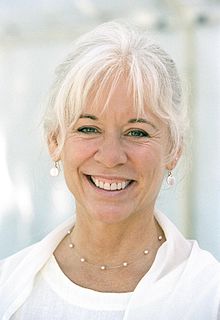A Quote by Seneca the Younger
The evil which assails us is not in the localities we inhabit but in ourselves. We lack strength to endure the least task, being incapable of suffering pain, powerless to enjoy pleasure, impatient with everything. How many invoke death when, after having tried every sort of change, they find themselves reverting to the same sensations, unable to discover any new experience.
Quote Topics
Related Quotes
Every life is punctuated by deaths and departures, and each one causes great suffering that it is better to endure rather than forgo the pleasure of having known the person who has passed away. Somehow our world rebuilds itself after every death, and in any case we know that none of us will last forever. So you might say that life and death lead us by the hand, firmly but tenderly.
Many animals experience pain, anxiety and suffering, physically and psychologically, when they are held in captivity or subjected to starvation, social isolation, physical restraint, or painful situations from which they cannot escape. Even if it is not the same experience of pain, anxiety, or suffering undergone by humans- or even other animals, including members of the same species- an individual's pain, suffering, and anxiety matter.
We are all, always, the desire not to die. This desire is as immeasurable and varied as life's complexity, but at bottom this is what it is: To continue to be, to be more and more, to develop and to endure. All the force we have, all our energy and clearness of mind serve to intensify themselves in one way or another. We intensify ourselves with new impressions, new sensations, new ideas. We endeavour to take what we do not have and to add it to ourselves. Humanity is the desire for novelty founded upon the fear of death. That is what it is.
For, after all, if it is from Christ that we are to learn how God relates himself to sin, suffering, evil, and death, it would seem that he provides us little evidence of anything other than a regal, relentless, and miraculous enmity; sin he forgives, suffering he heals, evil he casts out, and death he conquers. And absolutely nowhere does Christ act as if any of these things are part of the eternal work or purposes of God.
Whatever is fitted in any sort to excite the ideas of pain and danger, that is to say, whatever is in any sort terrible, or is conversant about terrible objects, or operates in a manner analogous to terror, is a source of the sublime; that is, it is productive of the strongest emotion which the mind is capable of feeling... When danger or pain press too nearly, they are incapable of giving any delight, and are simply terrible; but at certain distances, and with certain modifications, they may be, and they are, delightful, as we every day experience.
People are afraid of themselves, of their own reality; their feelings most of all. People talk about how great love is, but that's bullshit. Love hurts. Feelings are disturbing. People are taught that pain is evil and dangerous. How can they deal with love if they're afraid to feel? Pain is meant to wake us up. People try to hide their pain. But they're wrong. Pain is something to carry, like a radio. You feel your strength in the experience of pain. It's all in how you carry it.
Why does death engender fear? Because death meant change, a change greater then we have ever known, and because death was indeed a mirror that made us see ourselves as never before. A mirror that we should cover, as people in olden days covered mirrors when someone died, for fear of an evil. For with all our care and pain for those who had gone, it was ourselves too we felt the agony for. Perhaps ourselves above all.
People who have intended and loved what is evil in the world intend and love what is evil in the other life, and then they no longer allow themselves to be led away from it. This is why people who are absorbed in evil are connected to hell and actually are there in spirit; and after death they crave above all to be where their evil is. So after death, it is we, not the Lord, who cast ourselves into hell.
We have tried everything to get rid of suffering. We have gone everywhere to get rid of suffering. We have bought everything to get rid of it. We have ingested everything to get rid of it. Finally, when one has tried enought, there arises the possibility of spiritual maturity with the willingness to stop the futile attempt to get rid of it and, instead, to actually experience suffering. In that momentous instant, there is the realization of that which is beyond suffering, of that which is untouched by suffering. There is the realization of who one truly is.
If we cannot remain present during sleep, if we lose ourselves every night, what chance do we have to be aware when death comes? If we enter our dreams and interact with the mind's images as if they are real, we should not expect to be free in the state after death. Look to your experience in dreams to know how you will fare in death. Look to your experience of sleep to discover whether or not you are truly awake.
We become pitiable and ridiculous when we imbibe an unreasoned mysticism in our life without any natural or substantial basis. People like us, who are proud to be revolutionary in every sense, should always be prepared to bear all the difficulties, anxieties, pain and suffering which we invite upon ourselves by the struggles initiated by us and for which we call ourselves revolutionary.
Pain and suffering are in themselves bad and should be prevented or minimized, irrespective of the race, sex, or species of the being that suffers. How bad a pain is depends on how intense it is and how long it lasts, but pain of the same intensity and duration are equally bad, whether felt by humans or animals.
The duties God requires of us are not in proportion to the strength we possess in ourselves. Rather, they are proportional to the resources available to us in Christ. We do not have the ability in ourselves to accomplish the least of God's tasks. This is the law of grace. When we recognize it is impossible for us to perform a duty in our own strength, we will discover the secret of its accomplishment.
Many white people experience themselves as powerless, even in the face of privilege. But the fact is that we all have a sphere of influence, some domain in which we exercise some level of power and control. The task for each of us, White and of color, is to identify what our own sphere of influence is (however large or small) and to consider how it might be used to interrupt the cycle of racism.








































